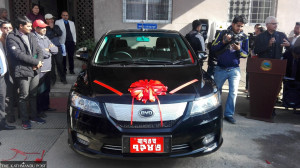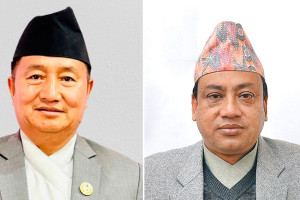Miscellaneous
Always prepared
Nepal Scouts, established with just 22 Scout Masters in 1952, now has evolved into one of the largest volunteer organisations in the country—with over 60,000 committed members united under its umbrella.
Nepal Scouts, established with just 22 Scout Masters in 1952, now has evolved into one of the largest volunteer organisations in the country—with over 60,000 committed members united under its umbrella. The scout movement contributes to the education of young people through a value-system based on the principles of scouting, in order to help build a better world where people are self-fulfilled and play a constructive role in the society. Five dimensions of the human development—physical, social, spiritual, intellectual and emotional—are given due priority in scouting so that individuals grow and are equipped to give back to their respective societies.
As per the motto of Scout—’Be Prepared’—set during the founding of the organisation by Lord Baden Powell, scouts are given training in regards to working effectively during disasters, where they provide support as volunteers. Realising the importance of scouting, the Sushil Koirala government came up with the ‘One School, One Scout Troop’ and ‘One Electoral Constituency, One Crew’ policies. The erstwhile government also announced its commitment to the expansion of scouting across the country, both at the school and at the community level. Leaders of Nepal Scouts say that scouting provides life skills and knowledge which is not gained in the schools or at home.In over 100 years since its establishment, scouts have created networks in 217 countries with 45 million members and scout’s international governing body has aimed to increasing it by 10 percent every year. Nepal Scouts has also aimed to increase its membership to 210,000 by 2025. “As government itself has come up with an expansion plan, we hope to attain the target within the deadline,” said Rabin Dahal, Chief Commissioner of Nepal Scouts.
Scouts are categorized under three age groups. Those between seven to 11 years are called Cub Brownies, while those between 11 to 16 age groups are called Girls/Boys Scout. Scouts between 16 to 24 years are named Rangers. Similarly, a group of six to eight scouts is called a ‘patrol’, while four patrols comprise to form a ‘troop’.
Scouts learn by practical action and are best known for their benevolence, disciple and therefore their trustworthiness. Through scouting, scouts develop a feeling of brotherhood and sisterhood, whereby they become ready to serve where the society needs them the most.
Scouting and School education
While schools give formal education, scouting provides life skills through informal methodologies. From the very beginning, the Education Ministry and Nepal Scouts have worked in close collaboration to unite a large number of students under the scouting banner. With the formation of Ministry for Youth and Sports, it now is working as the line ministry for scouting in Nepal. Anyone, irrespective of their age or sex, can become a scout, however, worldwide, it is students who comprise the largest share of the scouting fraternity. Out of 60,000 scouts in Nepal, some 52,000 are from schools alone, which portrays how the young are attracted to the volunteer organisation.
Starting a year ago the government has joined hands with Nepal Scouts in order to expand its networks in schools across the nation. Currently, a large share of scouts come from private schools, therefore plans are afoot to expand scouting equally in public schools as well. Scout leaders say that as the cost has to be covered by the members themselves, the students from community schools who come from the poorer families don’t join scouting despite their keen interest. In order to tackle the conundrum, the government is coming up with a plan to help such students with the uniforms so that money is no longer an obstacle . The government is also coming up with a partnership programme between the private and public schools to strengthen scouting in Nepal.
Scouts in disaster management and volunteerism
Scouts are always prepared to help during disasters and to support a community in need. Their presence is visible mainly during rescue and relief missions in the aftermath of disasters and while volunteering during the festivals and large social gatherings. The role played by Nepal Scouts in support of the Gorkha earthquake has been lauded from different quarters. During last year’s quakes, it was scouts who first reached sites including Lainchaur, Basantpur and the Sankhu area. Around 5,000 scouts were mobilised for the relief and rescue operation in 14 worst-affected districts after devastating earthquakes on April 25 and May 12, 2015.
The leaders at Nepal Scouts claim that locals from Sankhu did not even let security personnel and volunteers from political parties enter their locality in the immediacy of the disaster, as millions of cash and valuable items were buried in the rubble. They feared that they would never get their belongings back if the rescuers were not trust worthy. The fact that the properties, worth millions of rupees, were returned back to owners by scout rescuers helped them win over the hearts and minds of the victims, thereby increasing their credibility. Furthermore, scouts also helped in the mass cremation of the victims killed in the earthquake. They also contributed in the construction of temporary learning centres in places where school buildings had been reduced to rubble. Swedish King, who is also the patron of the World Scout, lauded Nepal Scout’s contribution to disaster management during an international conference in France last year. Nepal Scout representatives were given special time to speak on they were mobilised and what role they played while serving the victims. Their commendable role during the relief and rescue operations was also appreciated by the Scout Regional Conference in South Korea a year ago.
Currently, dozens of scouts are involved in reconstruction drives in affected districts. Some 200 volunteers helped in the reconstruction drive led by the Dhurmush-Suntali Foundation in Giranchaur of Sindhupalchok district for more than two months. Scounts still support the initiative. Scout volunteers are also always in the forefront, ready to help, during festivals or other large social gatherings. Lining visitors in temples, maintaining discipline, providing water and helping with first aid are some major volunteering work they carry out during the festive season.
Nepal Scout and International Relations
Around 300 delegates and observers from 30 countries across the world have gathered in Kathmandu. This is probably the largest international conference organised in the country in the aftermath of the devastating earthquake last year. For those who think Nepal is unsafe, the event proves that the country can host any kind of international conferences. The role of Nepal Scout in making the conference success has been widely lauded. Those attending in the conference can help in boosting the tourism sector of the country once they understand the ground realities here. Nepal has tried to publicise its touristic possibilities by tying up with the Scout. To attract the attention of millions of scouters, Nepal government named a 5,890-metre mountain from Dolakha as BP
Peak in celebrations of the establishment of Scout nine years ago. Similarly, a trekking trail from Kakani to the peak has also been named after Baden Powel. Every year dozens of scouters from various parts of the world come to Nepal to scale the peak.
Conference Delegates on Nepal Scouts
Low Lih Jeng, Chairperson, Asia Pacific Regional Committee

Nepal Scouts is vibrant and has made its place in the international Scout forum. The numbers here are increasing significantly, which is a good sign that lots of people are ready to partake in service through scouting.This is a good sign even for World Scouts, which is looking forward to increasing the number of scouts in the future. Nepal is doing equally better with the Girls Scout. The leadership here is quite aware of how more girls can be united under our umbrella and the result so far has been very encouraging. Through the conference, we aim to come up with a strategy that not betters the performance of Nepal but of the entire Asia Pacific Region.
Anita Tiessen, CEO, World Association of Girl Guides and Girl Scouts (WAGGGS)

Developing women as leaders is our priority and currently our main focus. The participation of girls in scouting is encouraging, but the leadership is not at par with that of the boys.Girls all around the world are capable of taking the lead in any organisation but they need leadership skills, exposure and opportunities to that end. WAGGGS has been helping girls in the aforementioned issues and the conferences like these help us formulate plans and policies, thereby evaluating the performancesof the past. The delegates in the gathering will brainstorm for five days and come up with strategies to meet the set target.
Ching Ching Wee-Ong, Regional Director for the Asia Pacific Region

Scouts looks atthe overall development of both boys and girls and believes that both can perform equally well, given that they get the opportunities. We emphasise developing an individual to her fullest potential and developing leadership skills by giving her the skills required for it. Nepal is a member with one of highest number of Girl Scoutsin the region, which shows that that girls and boys can have good collaboration and cooperation, which is an encouraging for all of us. I am happy that NepalScouts has given a significant number of young girls the opportunity to grow.
Daljit BK Sirpaili, Minister for Youth and Sports

Nepal government and Nepal Scouts have been partnering ever since the establishment of Nepal Scouts more than six decades ago. We have been jointly conducting a number of programmes for social, physical, spiritual, intellectual and emotional development of the scouts. Realising the importance of scouting, the government has already started preparations to include it in the school-level curriculum. Similarly, Ministry of Youths and Sports has started a programme to prepare one troop each of boys and girls comprising of 32 members, in all the electoral constituencies in the seven provinces. The Constitution of Nepal envisions for 165 electoral constituencies, meaning that the programme will be initiated in 165 community-schools across the country. Similarly, the Ministry is also partnering with Nepal Scouts to prepare a crew, comprising 32 members, in each district, who can be mobilised during disasters.
I have learnt that Nepal Scout Act has not been amended for decades ,despite the fact that the bill has been registered in the Parliament Secretariat. I will make every effort to endorse the bill as soon as possible. Our Ministry, as a line ministry of the scouting fraternity, is supporting this ongoing conference and will help implement the policies and programmes that are developed in the five-days of intense discussion. I believe we can together bring a change in our youth and make them more competent so that they can contribute for the betterment of their society and nation as a whole.
Malanie Bennelt, Vice-Chair, Asia Pacific Region

I am really impressed by Nepal and Nepal Scouts. Empowering girls is very important, as they are the leaders of the next generation. Empowering them means making them capable of contributing in not just their communities but the nation as a whole. WAGGGS has lots of programmesaimed at supporting the overall development of girls ranging from their social, educational and educational skills. Those girls, united under the scouting banner, get life skills that make them self-reliant and confident so that they can contribute to their communities and nations. The role Nepal Scouts is playing to this effect is very encouraging and hopefully this is going to be more effective in the future.




 24.71°C Kathmandu
24.71°C Kathmandu











